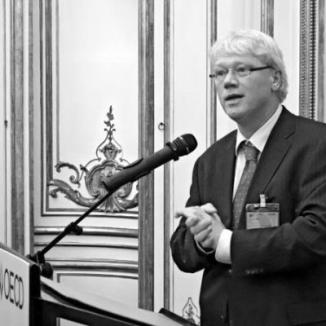State Aid evaluation: two years of implementation
This event discussed the evaluation of state aid and how it can contribute to better policy-making.
Speakers
Reinhilde Veugelers
Senior fellow
Georg Zachmann
Senior fellow
Nicola Pesaresi
Head of Unit, European Commission, DG COMP,
Gert Jan Koopman
Director General, DG NEAR, European Commission
Pantelis Koutroumpis
Research Fellow,the Innovation and Entrepreneurship Group, Imperial College London and Fellow, Columbia Institute of Tele-Information, Columbia Business School,
Theo Roelandt
Chief Analyst Enterprise & Innovation, Netherlands Ministry of Economic Affairs,
Otto Toivanen
Professor, Department of Managerial Economics, Strategy and Innovation, KU Leuven,
summary
This event reviewed the goals, methodology and initial results of state aid evaluation to Member States in the last two years. Because Member States are required to conduct ex-post evaluations but are given some freedom as to how they do this, the event helped representatives from across Europe collaborate to discuss effective methods and practices.
Deputy Director General Koopman of DG COMP and Senior Fellow Reinhilde Veugelers opened the discussion by reviewing the goal of such evaluation methods: to produce effective, evidence-based policymaking. They reminded the audience that the standards for such future funding are high, and that the existing programmes would provide the European Commission with a rich database from which to draw results and policy evaluation tools.
They also focused on which questions need to be asked, such as: Is this state aid making a difference? For whom, and when? How does it work for different subgroups of people? How effective is it vis-à-vis other similar policies? How do we define the counterfactual to determine causal effects? And which segments of economic health do we measure to see impact, i.e. innovation, growth, or employment? They added that such questions are critical to design proper ex-post evaluation methods and experiments.
During the panel, Head of Unit Nicola Pesaresi from DG COMP examined the why of policy evaluation. He pointed out that without rigorous evaluation, no one can expect policy to improve. With adequate evaluations, however, current and future schemes will continue to improve and become more efficient and effective. He reiterated that direct and indirect effects must be studied, as well as how well the effects compare with the expected results. He noted that the Commission was primarily interested in how regional R&D and Investment aid are being used.
The remainder of the time was given to Chief Analyst Theo Roelandt of the Netherlands Ministry of Economic Affairs to discuss specific examples from the Netherlands in its ex-post evaluations of policies related to enterprise and innovation. He began by commenting that it is the duty of policymakers to give taxpayers the best “bang for their buck” and only keeping policies that are proving to make a difference. In the Netherlands, there is a law requiring all subsidy schemes to be evaluated at 5 year increments, and unless proven effective, to be disbanded. Thus rigorous studies are done at regular intervals and constantly improved.
His first example was a “WBSO” subsidy scheme aimed at stimulating private R&D investment. Following econometric trials, results show that there is even more private R&D investment than expected. The second example, an “Innovation Credit” subsidy also proved to be effective after econometric trials were used. His third example, related to innovation in shipbuilding, did not improve shipbuilding innovation, and was thus cut off from any further funding.
The Q&A discussion highlighted the inability for econometrics to perfectly prove all of the positive or negative consequences of any given policy, and its limitations were enumerated. Those on the panel also responded to questions about uniformity with the statements that “there is no simple one-size-fits-all methodology or model methodology that will work for each of these schemes, but they must pass basic standards”. Lastly, there was a call from small regional government representatives for Member States to publish evaluation plans and methodologies for public use.
Event summary by Brian Lewis, Research Intern
VIDEO RECORDING
First panel: evaluation of business support policies at EU and national level
Second panel: improving the effectiveness of innovation, digital and sustainability policies
Event materials
Pantelis Kotroumpis - Presentation
Nicola Pesaresi - Presentation
Reinhilde Veugelers - Presentation









